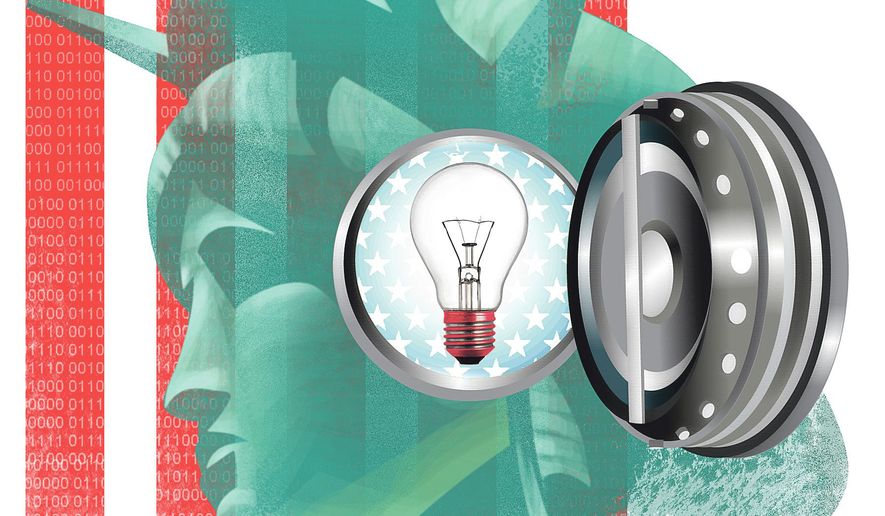OPINION:
The hacking attack of Sony Corp. and the compromising of its intellectual property should send a wake-up call to American business. If Sony can be hacked, so too can our companies that make defense technologies. This attack reveals that the very innovations that give us our competitive edge in the world, both commercially and strategically, are gravely at risk.
In November, the Pentagon announced the Defense Innovation Initiative, which is designed to promote fresh thinking about how we can maintain our military superiority through technological innovation, despite tighter budgets and the corrosive effects of two long wars. Unfortunately, this strategy will fail unless both government and business place higher priorities on technology security policy and counterintelligence.
Two of our adversaries are stealing our technology at levels that exceed those of the Cold War. China in particular is using commerce as a cover for massive espionage, the fruits of which are deployed with amazing efficiency in the greatest military buildup on the face of the earth — a buildup consistently underestimated by our government.
Simultaneously, Russian industrial espionage continues at enormous levels and fuels Moscow’s military buildup.
Mostly under the cover of trade, but also including the visits of students, scientists and tourists, China has some 50,000 spies in the United States. In any recent year, the Chinese have made 5,000 visits annually to our most sensitive national laboratories, where a “visit” consists of a stay ranging from two weeks to two years. Large numbers of Chinese students enter our most advanced scientific and technical academic institutions, where they gain access to sensitive technological innovations.
Chinese businessmen who visit American companies as tourists or exchange-program participants have routinely copied the layouts of factory machinery to develop their own identical manufacturing capability. Additionally, Beijing often imposes a condition for Americans setting up manufacturing facilities in China: that they also bring their research and development operations to China. Once there, American technological innovations can all be considered compromised.
All this is in addition to the Chinese and Russian cyberespionage avalanche, which persists daily as the greatest theft of intellectual property in world history.
What makes a reversal of this situation particularly difficult is that large parts of the American business community have been politically neutralized by China because of the allure of the Chinese market. This, in turn, has produced a widespread willful blindness about the vast array of Chinese activities that are inimical to our nation’s security.
So long as this situation is not reversed, technological innovations contemplated by the administration’s initiative may even may be found incorporated in Chinese or Russian weapons systems before they are adopted in our own.
Reversing this situation requires a serious technology security program and the strengthening of U.S. counterintelligence. This is not simply government’s responsibility; it will require the involvement of American businesses.
The first step in technology security is minimizing trade in sensitive military and dual-use technologies. It may even mean minimizing every kind of trade with Beijing, especially given the psychological disarmament that such trade produces.
The argument that expanded U.S.-Chinese trade will reinforce Chinese economic reforms, which will lead, in turn, to political reforms, has proved hollow. The Chinese regime remains stubbornly communist in its determination to maintain a monopoly of power.
A second step must be to reconstitute a version of the Cold War-era CoCom, the multinational Coordinating Committee for Multilateral Export Controls. Optimizing such a technology security program requires securing cooperation among our allies, a difficult task given the global reach of China’s commerce.
A third step necessitates giving greater counterintelligence protection to sensitive technology development programs. This requires, among other things, layers of deceptive facades designed to get foreign intelligence services to believe that a given project is something other than it is. We know that some corporations have created these kinds of deceptions, and some have even created blueprints with false information, including misleading mathematical calculations specifically designed to derail those who would steal them. Many more corporations need to develop such programs.
Counterintelligence, one of the most challenging arts of statecraft, should be among the highest national priorities. Fortunately, there is a ray of hope here. Director of National Intelligence James R. Clapper is setting up a National Counterintelligence and Security Center, which will combine operations, analysis and technological capabilities into one organization.
If this center is to optimize its effectiveness, however, its personnel will have to have intimate knowledge of counterintelligence history and case studies, the methods and operational traditions of foreign intelligence services, and the political strategic cultures of their sponsoring governments. They must understand strategic deception and be able to think the way our adversaries think. Regrettably, U.S. government agencies, favoring intelligence collection over counterintelligence, tend not to demand or cultivate such expertise.
If America is to remain competitive — economically, militarily and in intelligence technologies — we must demand expertise in these arts of statecraft and reorder our national priorities to protect one of our greatest strategic advantages: our capacity for technological innovation.
• John Lenczowski is founder, president and professor at the Institute of World Politics. He served as President Reagan’s White House adviser on Soviet affairs from 1983 to 1987.




Please read our comment policy before commenting.